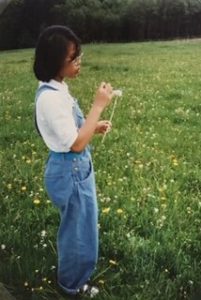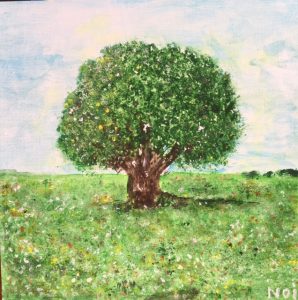Noi's Story
Written by Dr. Richard O. Williams
 Dr. Richard Williams’ daughter Noi is autistic, and understanding her and how she thinks has motivated him to understand and study autism. He adopted her many years ago from an orphanage in Bangkok, Thailand on her second birthday. At the time, she didn’t walk, talk, or walk or speak, even in her native Thai. When they held her, she did not grasp back, as most infant children do. According to him, it was like holding a bag of potatoes that didn’t want to be held. She didn’t make eye contact either. At the same time, she was very content and happy and didn’t cry, and she was profoundly interested in the change in her environment. In fact, she was intensely curious and focusing on everything. Noi learned to walk in the first six months they had her, and when asked today, she can remember much of her first years of her life. At that time, Richard was working for the World Health Organization (WHO) in Nairobi, Kenya. When Noi started school there, her kindergarten teacher told Richard and his wife that they didn’t think she would ever talk, but they still intended on teaching her to read. Her teacher was able to teach her to read, and as a result, Noi learned to talk and became verbal quite quickly. Up to that point she had a very limited verbal vocabulary of a few essential words like hot and cold, but Noi often rocked back and forth when she was a baby (a classic symptom of autism) and was ecstatic and overwhelmed when she was first placed on a swing, because she craved the sensory input that it offered.
Dr. Richard Williams’ daughter Noi is autistic, and understanding her and how she thinks has motivated him to understand and study autism. He adopted her many years ago from an orphanage in Bangkok, Thailand on her second birthday. At the time, she didn’t walk, talk, or walk or speak, even in her native Thai. When they held her, she did not grasp back, as most infant children do. According to him, it was like holding a bag of potatoes that didn’t want to be held. She didn’t make eye contact either. At the same time, she was very content and happy and didn’t cry, and she was profoundly interested in the change in her environment. In fact, she was intensely curious and focusing on everything. Noi learned to walk in the first six months they had her, and when asked today, she can remember much of her first years of her life. At that time, Richard was working for the World Health Organization (WHO) in Nairobi, Kenya. When Noi started school there, her kindergarten teacher told Richard and his wife that they didn’t think she would ever talk, but they still intended on teaching her to read. Her teacher was able to teach her to read, and as a result, Noi learned to talk and became verbal quite quickly. Up to that point she had a very limited verbal vocabulary of a few essential words like hot and cold, but Noi often rocked back and forth when she was a baby (a classic symptom of autism) and was ecstatic and overwhelmed when she was first placed on a swing, because she craved the sensory input that it offered.
Following a near death bout of malaria at the age of three some of the progress that Noi had made was erased, especially concerning her ability to walk. They’re also sure that her bout with malaria likely worsened some of her autism symptoms or at least further delayed her adaptation and progress.
Their family later left Africa and moved to Germany when Richard took a teaching position at the University of Karlsruhe. In Germany, Noi stood out: she was the only non-white person, and she was autistic. Her teacher seemed to be against her pointing out in class how different she was from the others. Noi subsequently experienced a psychological crisis. They sent her to a US military school and her situation improved. In the course of this, they took her to an Army psychologist who, after seeing Noi, said, “Um, I don’t know what’s going on.” They then took her to the University of London and visited a psychologist there who diagnosed Noi with Asperger’s Syndrome. And with that diagnosis began Richard’s personal quest to learn everything he could about his daughter’s syndrome. They now know that she is on the spectrum and is quite autistic.
 Noi is 43 today, and she lives independently, drives and is content and happy. She has carved out a life that she can handle, and what she’s doing now would have been unthinkable three to five years ago, but there is still much she could do. The authors meet with Noi every Monday to talk with her and check in on her and to encourage her to try new things and experience new growth, but Noi takes life at her speed. Noi has seized her independence and is growing. As of today, she enjoys photography and painting and works part time at a restaurant as a busser, polishing glasses and refilling the patron’s water glasses. We have asked her why she doesn’t demand to do more at her job—she could easily memorize menu orders—but she is content for now doing her simple job, which giver her purpose and pleasure and provides her just the right amount of social interaction. Noi lives on her own—she has a financial trust that Richard set up for her that helps her makes ends meet—and she likes to take hikes and mixes well and goes on walks with her neighbors. Her personal life is simple and unencumbered as well: she is single and never really had a relationship and hasn’t thought twice about it. Like other autistic individuals, Noi ticks almost all of the boxes on the sensory issues checklist: she has tremendous hearing, is sensitive to the kind of clothes she wears, and is sensitive to foods and will only eat certain things. She also experiences a lot of anxiety, which is the most common and the most debilitating emotional issue for people and particularly girls on the spectrum. The following is a quick list of many of her symptoms and issues:
Noi is 43 today, and she lives independently, drives and is content and happy. She has carved out a life that she can handle, and what she’s doing now would have been unthinkable three to five years ago, but there is still much she could do. The authors meet with Noi every Monday to talk with her and check in on her and to encourage her to try new things and experience new growth, but Noi takes life at her speed. Noi has seized her independence and is growing. As of today, she enjoys photography and painting and works part time at a restaurant as a busser, polishing glasses and refilling the patron’s water glasses. We have asked her why she doesn’t demand to do more at her job—she could easily memorize menu orders—but she is content for now doing her simple job, which giver her purpose and pleasure and provides her just the right amount of social interaction. Noi lives on her own—she has a financial trust that Richard set up for her that helps her makes ends meet—and she likes to take hikes and mixes well and goes on walks with her neighbors. Her personal life is simple and unencumbered as well: she is single and never really had a relationship and hasn’t thought twice about it. Like other autistic individuals, Noi ticks almost all of the boxes on the sensory issues checklist: she has tremendous hearing, is sensitive to the kind of clothes she wears, and is sensitive to foods and will only eat certain things. She also experiences a lot of anxiety, which is the most common and the most debilitating emotional issue for people and particularly girls on the spectrum. The following is a quick list of many of her symptoms and issues:
- Claustrophobia
- Can hear sounds others don’t
- Remembers peoples’ looks and facial features
- Outstanding memory for places and time, license plates, etc.
- When given a sequence of 10 numbers, she can recite them back in reverse order
- Prefers large rooms and top floors in houses and hotels
- Hates wearing woolen sweaters (too scratchy) and skin-tight clothes (too confining and creepy)
- Hates looking at green, pink, and yellow neon lights because it hurts her eyes
- Dislikes bright lights in any room
- Sits in the back of theater because the big screen is overwhelming
- Hates all rough surfaces like sandpaper, chalk, pastel chalks, newspapers because feel offensive when touching her skin
- Hates loud noises, like alarms and sirens
- Gets disturbed when two people start talking in an otherwise quiet room
- Hates the smell and taste of coffee
- Hates cold air and weather, which makes her anxious
Noi is remarkably content with a life that wouldn’t be enough for most of us, but it works for her, and she has come a long way, which makes her representative of many individuals on the autism spectrum who deal with sensory issues throughout their lives.
